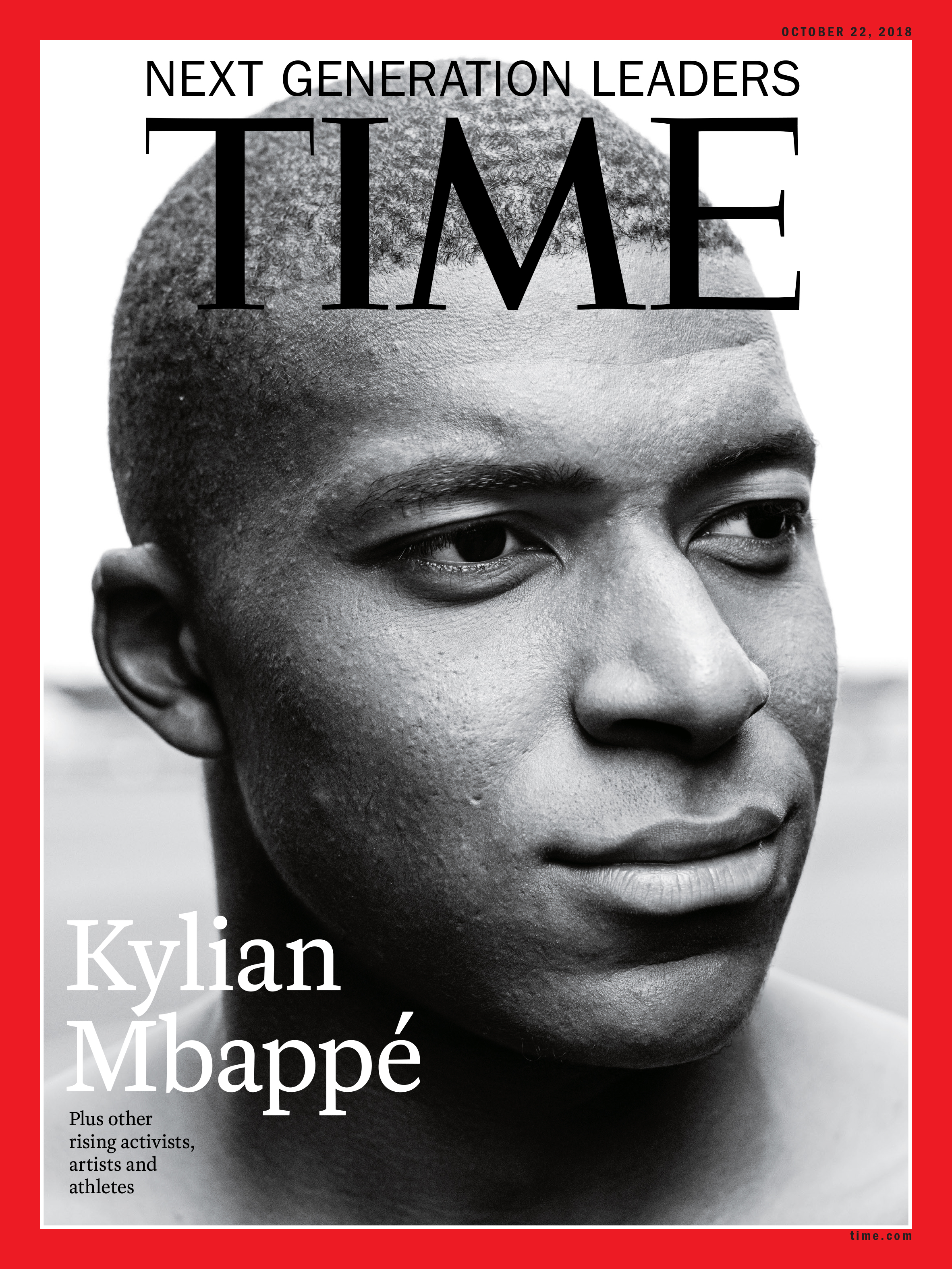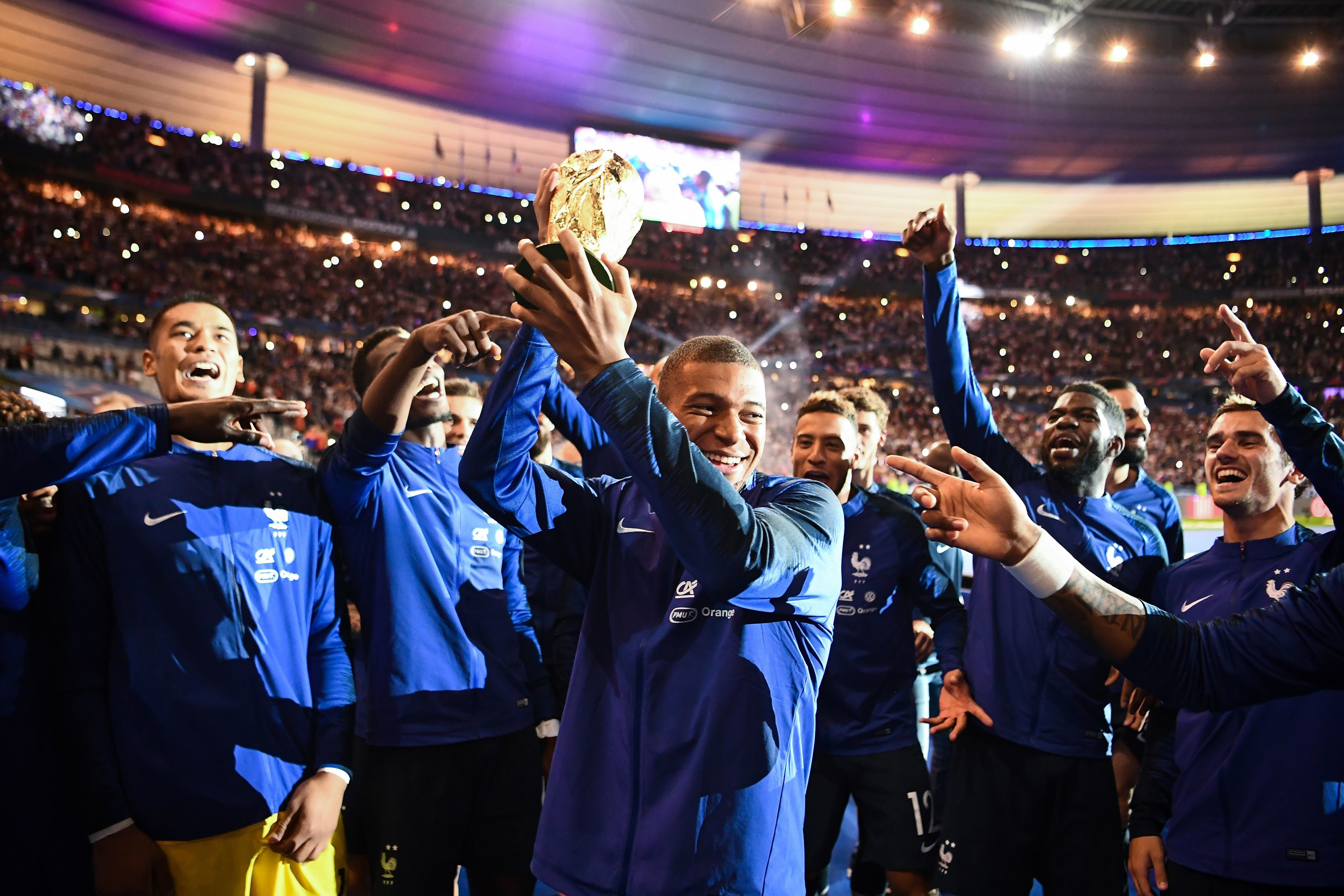You do not need to be a soccer fan to have heard of the rocketing French superstar Kylian Mbappé. At just 19, Mbappé’s virtuoso performance during the summer’s FIFA World Cup in Russia turned every France match into an unmissable spectacle. The entire stadium seemed to catch its breath as Mbappé flew across the field, scoring goal after goal, and then sliding on to his knees with a grin. Mbappé’s astonishing play helped clinch France’s World Cup victory on July 15, sending a million people into the streets of Paris for an ecstatic all-night party. A national hero was born.
Back home in Paris, where he plays forward for Paris Saint-Germain, or PSG, Mbappé has thrilled crowds all over again, on Oct. 7 scoring four goals in 13 minutes—almost unheard of—in a match against Lyon. His teammate Neymar, the world’s highest-paid player, declared him a “phenomenon.” The word seems apt. Raised by immigrant parents in the low-income Paris suburb of Bondy, Mbappé is now one of the world’s most famous athletes, reportedly earning 18 million euros a year (about $20 million) from PSG alone. Rappers have written songs about him, Nike sells sneakers in his name, LeBron James wants to be his friend.
Many have wondered whether this teenager’s explosive fame could derail his game, or his life. We wondered too. As the soccer season began, Mbappé met TIME to discuss managing his soaring celebrity and how he stays grounded enough to develop his career.
The interview has been edited for length and clarity.
TIME: How has the last year changed your life? Do you feel in some way that you missed your youth?
Kylian Mbappé: Yes of course. My life has been totally turned upside down. It began with this extremely expensive transfer to Paris Saint-Germain, [PSG’s transfer deal with Mbappé’s former club AS Monaco is worth more than $200 million] which was much talked about. The World Cup continued along this line. Although I am so happy and I am living the life I always dreamed of, I think I have missed out on something. I did not have the moments that “normal people” do during adolescence, like going out with friends, enjoying good times. I was right away in the world of grown-ups, and they immediately demanded that I behave like an adult. My teammates were in their 30s, 35 or even in their 40s, like Gigi [PSG goalkeeper Gianluigi Buffon]. Right away, they expected me to be mature and adjust to this world.
Tell me about your family. You seem very close to them.
We have always been very close, and very much a family, all together at home. We eat our meals together at the table. We have never given that up. I was raised with my two parents and my two brothers, we were always all together. Whether it was my first match for the youth [league] or now in front of 80,000 spectators, they are always there for me. When a player has a healthy, balanced family, he can give his all.

What do you think are the most important values you can impart to the next generation?
The value of respect. I think it is the basis for everything. I have learned that the biggest stars and the greatest players are the most humble ones, the ones who respect people the most. That is why they are respected by everyone. We can be the best and the world champions, and in four years you are forgotten because there is someone else who has arrived and done better than you. I think these are the three criteria: Respect, humility and lucidity.
It must be difficult in your position that humility. How do you stay grounded?
The World Cup is something fantastic that happened to me. But I think what comes next could be even better. I have always wanted to make it big, to be one of the best, and to be in the place where I am. From when I was a very young age. I dreamed of becoming a world champion, I dreamed of becoming France’s champion. Now that I have arrived here I’m dreaming of something else. We have won [the World Cup] one time. To win twice in a row [in the World Cup 2022, in Qatar] is something that has not happened for many years. A career in football is only 15 years for the lucky ones. So during those 15 years we should not sleep.
Why is football so important for young people in Bondy, where you grew up?
Bondy is a city that breathes football. There is boundless passion. The whole city is addicted to football. They follow all the matches and the extraordinary exploits of their favorite teams. It is true, it is a dream; it is more than a dream for all young people who play football, more now than when I played or grew up there.
It seems that everyone in Bondy wants to be Kylian Mbappé. What kind of role model do you want to be for your generation and people coming of age at the moment?
I think being a model is about having exemplary behavior. When you are young, you admire the people you see on TV and you want to have the same gestures and the same attitudes and behave in the same way. It is a responsibility. I think it is enough to be myself. I was myself and I got here, and this is how I will continue to be. And why not inspire the new generation as I was inspired? It is like passing the baton.
Did you have a sense, that night of the World Cup final, that the whole world was cheering for Mbappé? What was that night like for you?
It is a lifetime dream. It is by far the most watched soccer competition. You know that the whole world is watching you when you enter the field, and you know that you are defending your country and that the whole country is behind when. It is really an immense pride and a desire to give everything to the country. I regret nothing. I’m so happy we won.
What did you feel at that moment when you won?
At that very moment, you have difficulty believing it. You say, ‘That’s it, we did it.’ But then seeing the media coverage and even our welcome parade in France, we quickly realized that we did something very big and that we left a mark in history.
You decided to donate all the proceeds from the World Cup to charity.
I did not need to be paid. I was there to defend the colors of the country. Also, I earn enough money—a lot of money. So I think it is important to help those who are in need. A lot of people are suffering, a lot of people have diseases. For people like us, giving a helping hand to people is not a big thing. It doesn’t change my life, but it changes theirs. And if it can change theirs, it is a great pleasure. I gave the money to the charity where I am a sponsor [Mbappé sponsors the French charity Premiers de Cordée] because being handicapped is something difficult. Showing them that they can do sports like everyone it is something close to my heart.
You have world fame now. What do you want to do with it, outside of soccer?
My mom always told me since a young age that to become a great soccer player, you must be before all a great man. I would like my celebrity to serve charity purposes, and to help people less well off. I have always considered myself as a privileged person from a kind of élite among the lucky ones. So I think we should help all those who have not had the luck I have had, to use my fame to help. Not only to be at the most beautiful dinners, in the most beautiful hotels, but to help those who are not like me are to live those moments that are unique.
Correction, Oct. 11
Due to transcription errors, the original version of this article misstated a teammate to whom Kylian Mbappé referred. It was “Gigi,” in reference to Gianluigi Buffon, not “Didi,” in reference to Didier Deschamps. The original version of this article also misstated Deschamps’ position. He is the manager of France’s national team, not the coach of aris Saint-Germain.
- Donald Trump Is TIME's 2024 Person of the Year
- Why We Chose Trump as Person of the Year
- Is Intermittent Fasting Good or Bad for You?
- The 100 Must-Read Books of 2024
- The 20 Best Christmas TV Episodes
- Column: If Optimism Feels Ridiculous Now, Try Hope
- The Future of Climate Action Is Trade Policy
- Merle Bombardieri Is Helping People Make the Baby Decision
